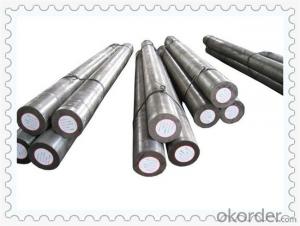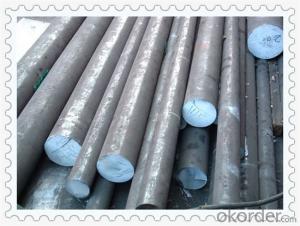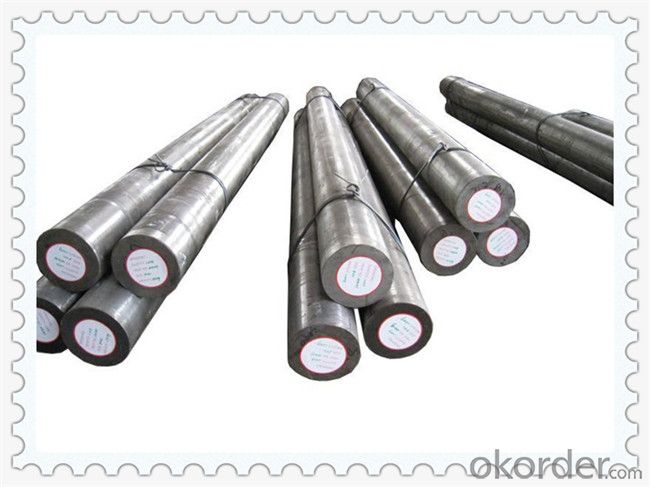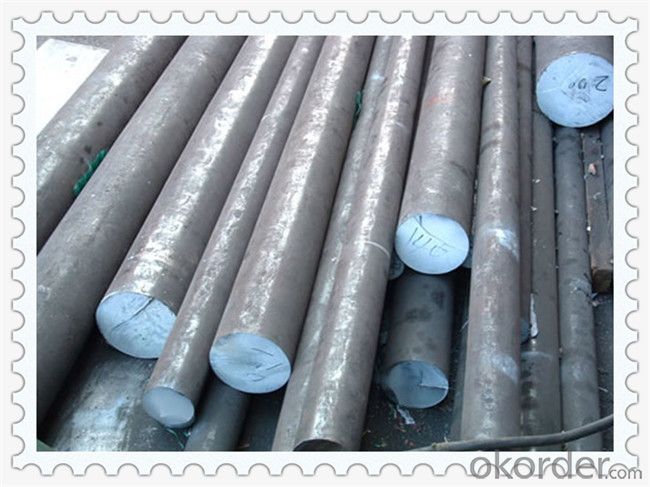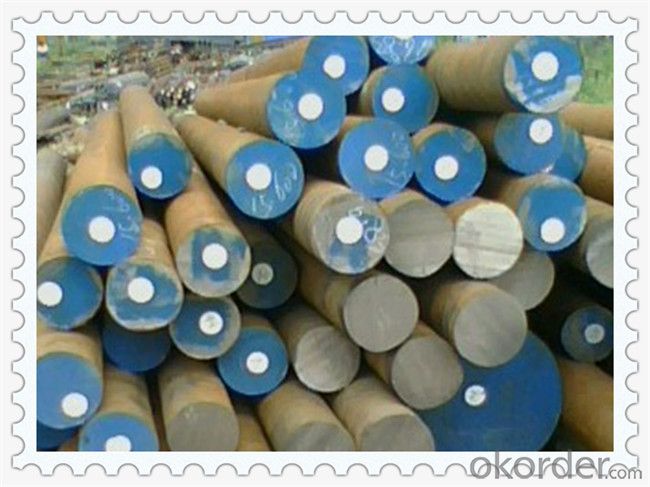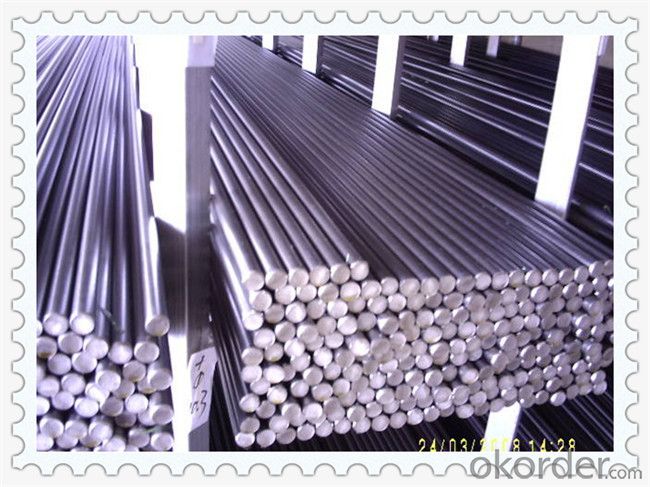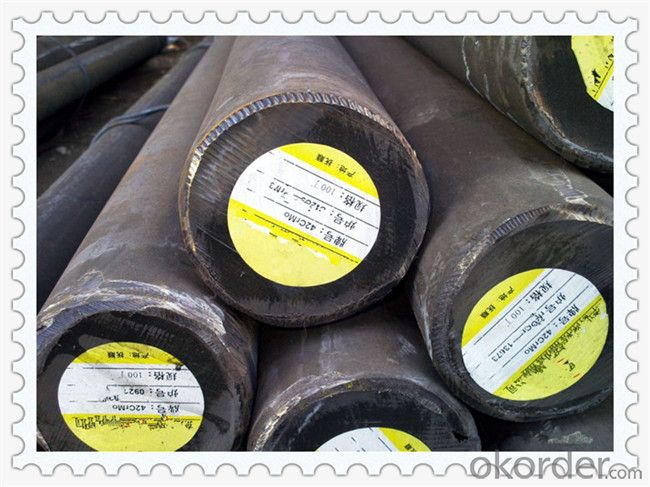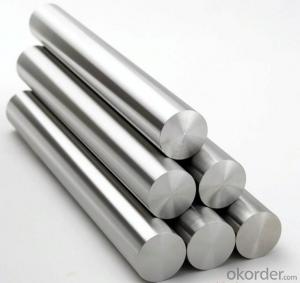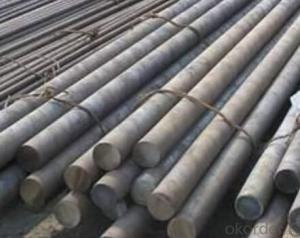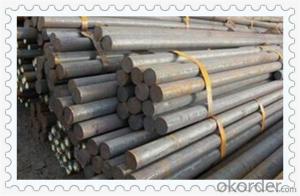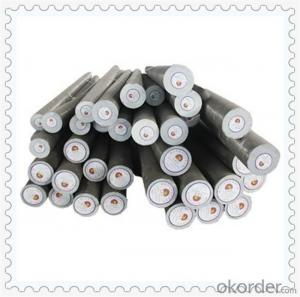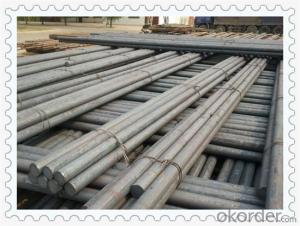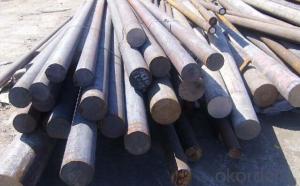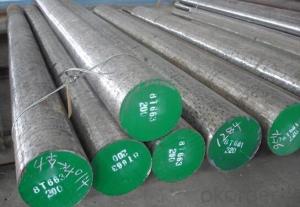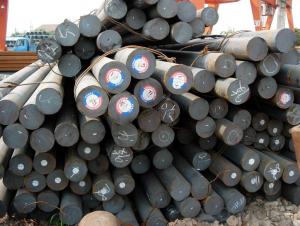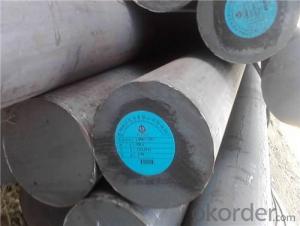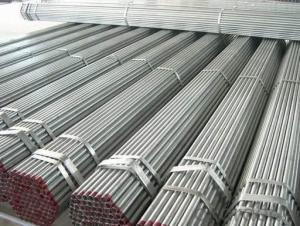35CrMo AISI 4135 Forged Round Bars 34CrMo4
- Loading Port:
- China main port
- Payment Terms:
- TT OR LC
- Min Order Qty:
- 30 m.t.
- Supply Capability:
- 10000 m.t./month
OKorder Service Pledge
OKorder Financial Service
You Might Also Like
35CrMo AISI 4135 Forged Round Bars 34CrMo4
Products Details
1. Process: EAF+LF+VD+ Hot forged
2. Certificate: CCS, ABS,GL, RS,BV,ISO9001
3. Delivery time: 30 days
4. MOQ: 20 Tons
Chemical Compasition (%)
| Grade | C | Si | Mn | Cr | Mo |
| 35CrMo | 0.32/0.40 | 0.17/0.37 | 0.40/0.70 | 0.80/1.10 | 0.15/0.25 |
Production Specification
Material | Hot forged steel round bar
|
Diameter | 80mm-1200mm
|
Length | steel round bar:2000mm-12000mm Straightness: 3mm/M max; square bar:100-1000mm, blocks sizes up to 800*1000mm
|
Process | EAF + LF + VD +(ESR) + Forged + Heat Treatment (optional)
|
Delivery condition | Hot forged +Rough machined (black surface after Q/T)+ Turned (optional) |
Delivery Time | 30 days
|
MOQ | 20 tons
|
Heat treatment | Normalized / Annealed / Quenched / tempered |
Forged ratio | no less than 3:1
|
Technical Data | According to the customer's requirement of Chemical Composition, Physical Properties and Mechanical Testing; SCM440 steel round bar available for test |
Test | Ultrasonic test according to SEP 1921-84 G3 C/c
|
Certificate of Quality | issued in English, in addition the normal terms, production process, the mechanical property (yield strength, tensile strength, elongation and hardness), forged ratio, UT test result, Grain size, heat treatment methods and the sample of is shown on the Certificate of Quality
|
Marking | Grade, heat NO. length will be stamped one each bar with required color
|
Payment | 30% advance by T\T, balance pay before shipment Irrevocable LC at sight
|
Application | Statically and dynamically stressed components for vehicles, engines and machines. For parts of larger cross-sections, crankshafts, gears.
|
Products Show
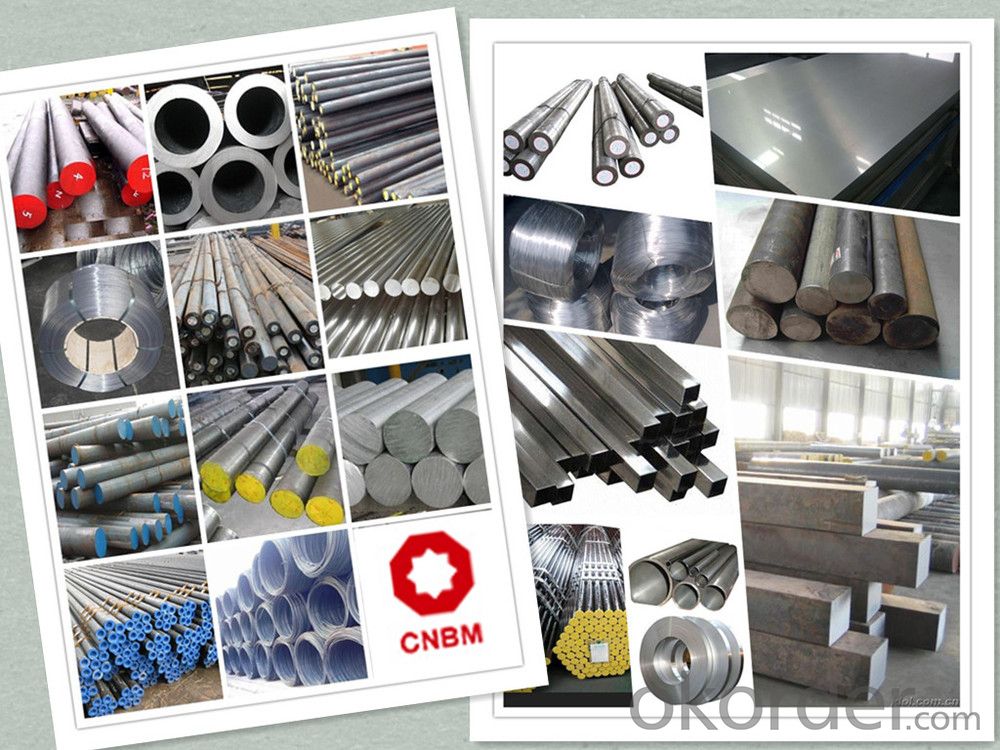
Product Overviews
| Product Name | Typical Grades | Diameter(mm) | Standard adopted |
| Carbon Steel | 20 (1020/S20C/C22) | Ø16-Ø300 |
GB/SAE/JIS/DIN
|
| 40 (1040/S40C/C40) | |||
| 45 (1045/S45C/C45) | |||
| Bearing Steel | GCr9 (51100/SUJ1) | Ø12-Ø250 | |
| GCr15 (52100/SUJ2/100Gr6) | |||
| GCr9SiMn (A485-Gr.1/SUJ3) | |||
Cr-Mo Steel | 20Cr (5120/SCr420H/20Cr4) | Ø12-Ø250 | |
| 40Cr (5140/SCr440/41Cr4) | |||
| 42CrMo(4140/SCM440/42CrMo4) | |||
| Gear Steel | 20CrNiMo | Ø16-Ø600 | |
| 20CrMn(5115/SMnC420/20MnCr5) | |||
| 20CrNiMo(8620/SNCM220/20CrMiMo2) |
Application
| Carbon Steel | Mold bottom, Plastic mold, Construction machinery parts Automobile parts, Security grills, Screens, Construction |
| Bearing Steel | Aerospace, Navigation, Nuclear energy, Chemical industry Electronic information, Petrochemical, Instrument and meter Transportation |
| Cr-Mo Steel | Mechanism & Fasteners gear, Stressed components for vehicles Engines and machines, Parts of larger cross-section |
| Gear Steel | All kinds of gears, Statically and dynamically stressed component for vehicles Engines and machine, Larger cross-section parts, Crankshafts |
Work Shop
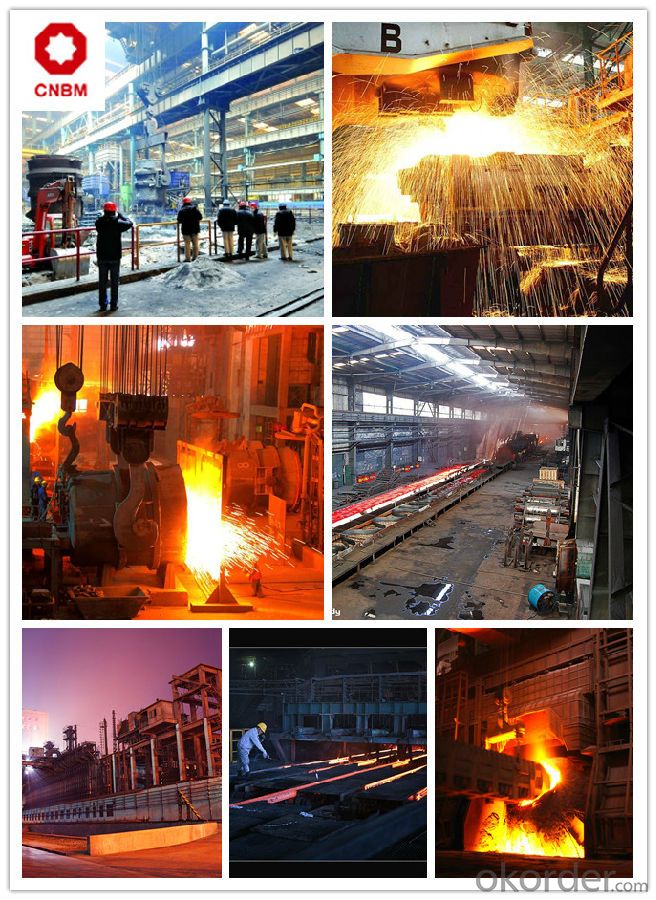
Company Information
CNBM International Corporation is the most important trading platform of CNBM group.
Whith its advantages, CNBM International are mainly concentrate on Cement, Glass, Iron and Steel, Ceramics industries and devotes herself for supplying high qulity series of refractories as well as technical consultancies and logistics solutions.

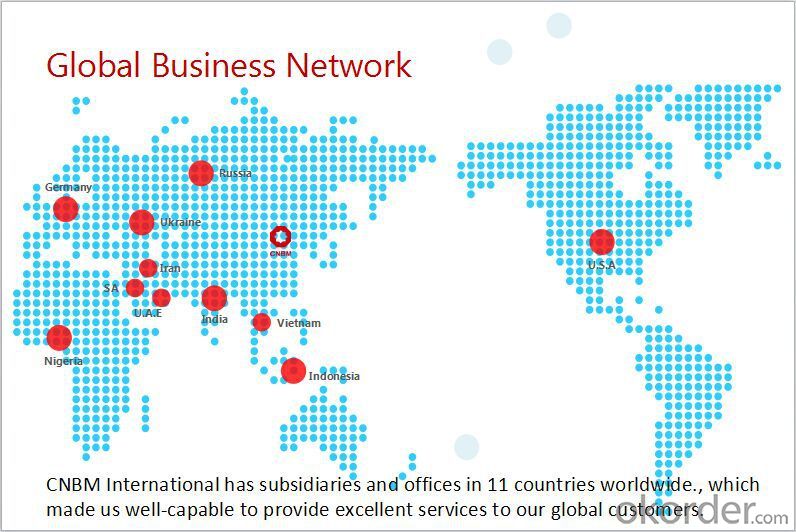
FAQ
1, Your advantages?
professional products inquiry, products knowledge train (for agents), smooth goods delivery, excellent customer solution proposale
2, Test & Certificate?
SGS test is available, customer inspection before shipping is welcome, third party inspection is no problem
3, Factory or Trading Company?
CNBM is a trading company but we have so many protocol factories and CNBM works as a trading department of these factories. Also CNBM is the holding company of many factories.
4, Payment Terms?
30% TT as deposit and 70% before delivery.
Irrevocable L/C at sight.
5, Trading Terms?
EXW, FOB, CIF, FFR, CNF
6, After-sale Service?
CNBM provides the services and support you need for every step of our cooperation. We're the business partner you can trust.
For any problem, please kindly contact us at any your convenient time.
We'll reply you in our first priority within 24 hours.
Packaging & Delivery
1, Packaging: seaworthy package or as required
2, Delivery: 35-45 days or based on quantity
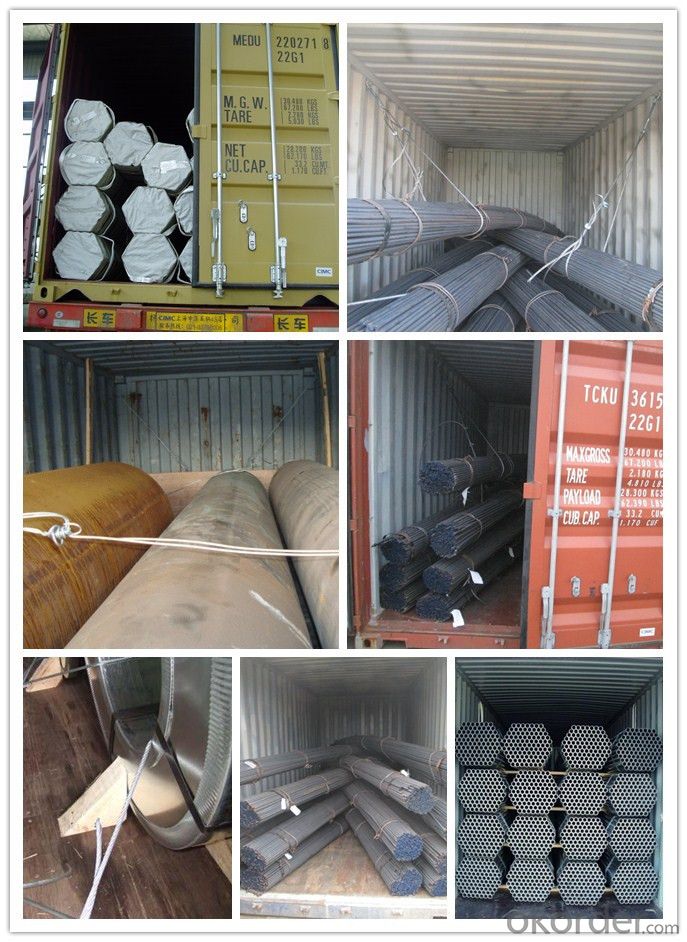
- Q: What is the difference between hot rolled and cold drawn steel round bars?
- Hot rolled steel round bars are made by heating a billet or ingot of steel to a high temperature and then rolling it into the desired shape. This process results in a rougher surface finish and less precise dimensions compared to cold drawn steel round bars. Cold drawn steel round bars, on the other hand, are made by pulling a hot rolled bar through a die to achieve the desired shape and size. This process produces a smoother surface finish and more accurate dimensions. Overall, the main difference between hot rolled and cold drawn steel round bars lies in the manufacturing process and the resulting surface finish and dimensional accuracy.
- Q: What is the cost of steel round bars?
- The cost of steel round bars can vary depending on factors such as the size, grade, and market conditions. It is recommended to contact suppliers or check online catalogs for the most accurate and up-to-date pricing information.
- Q: Can steel round bars be used for making gears?
- Certainly! Gears can indeed be made using steel round bars. The reason for their widespread use in gear manufacturing lies in their outstanding strength, longevity, and ability to withstand damage. These bars can be processed, subjected to heat treatment, and molded into different types of gears, including spur gears, helical gears, and bevel gears. Steel round bars provide exceptional accuracy and dependability, making them ideal for applications demanding durable and high-performing gears, like automotive transmissions, industrial machinery, and power transmission systems.
- Q: How do you measure the hardness of a steel round bar?
- The hardness of a steel round bar can be measured using various methods, with the most common being the Rockwell hardness test. In this test, a diamond or steel ball indenter is pressed into the surface of the steel at a specific load, and the depth of the indentation is measured. The hardness value is determined based on the depth of the indentation and the applied load. Other methods like Brinell and Vickers hardness tests can also be used, depending on the specific requirements and characteristics of the steel.
- Q: What are the different types of steel round bar surface finishes for improved aesthetics?
- There are several different types of steel round bar surface finishes that can be used to enhance the aesthetic appeal of the material. These finishes are often chosen based on the desired look and feel of the steel, as well as the intended application. Some of the most common surface finishes for steel round bars include: 1. Polished: This finish involves a series of abrasive processes that result in a smooth, reflective surface. It is commonly used in applications that require a high level of visual appeal, such as architectural structures or decorative pieces. 2. Brushed: This finish is achieved by brushing the steel surface with a wire brush or abrasive pad, creating a textured appearance. It provides a more subdued and contemporary look, and is often used in modern architectural designs or furniture. 3. Satin: This finish is similar to brushed, but with a finer texture. It creates a smooth and matte appearance, making it a popular choice for applications that require a sophisticated and elegant look, such as luxury fixtures or appliances. 4. Hammered: This finish involves creating a series of small dents or dimples on the surface of the steel, giving it a textured and rustic appearance. It is commonly used in applications that require a unique and artistic look, such as handrails or decorative accents. 5. Etched: This finish is achieved by chemically treating the steel surface to create a pattern or design. It allows for intricate and detailed designs, making it a popular choice for applications that require personalized or branded elements, such as signage or logos. 6. Powder-coated: This finish involves applying a layer of powdered paint to the steel surface and then baking it to create a durable and vibrant coating. It provides a wide range of color options and is often used in applications that require a decorative and long-lasting finish, such as outdoor furniture or architectural elements. Overall, the choice of steel round bar surface finish depends on the desired aesthetic outcome and the specific requirements of the application. Different finishes can enhance the visual appeal of the steel, making it suitable for various industries and design purposes.
- Q: Can steel round bars be used in the production of agricultural equipment?
- Yes, steel round bars can be used in the production of agricultural equipment. Steel round bars are known for their strength, durability, and versatility, making them suitable for various applications, including agricultural equipment manufacturing. They can be used for constructing frames, supports, axles, and other components that require high strength and resistance to wear and tear.
- Q: Are steel round bars susceptible to corrosion?
- Corrosion is a common issue for steel round bars, especially when they come into contact with moisture, oxygen, and certain chemicals. The degradation of the material occurs when the metal reacts with its surroundings. Steel, primarily composed of iron, can undergo different types of corrosion, including general corrosion, pitting corrosion, and stress corrosion cracking. When steel round bars are exposed to moisture and oxygen, they can experience general corrosion. This gradual deterioration manifests as the formation of an oxide layer on the surface, resulting in material loss and reduced strength over time. Pitting corrosion is another type that steel round bars may encounter. It involves localized damage on the metal's surface, leading to the creation of small pits. These pits can deepen and expand, compromising the structure and integrity of the bars. Stress corrosion cracking is a specific form of corrosion that affects steel round bars under tensile stress, in the presence of particular corrosive agents. This phenomenon can cause sudden material failure, even when stress levels are below the bars' yield strength. To combat corrosion, protective coatings and corrosion inhibitors are commonly applied to steel round bars. Methods like galvanization, where a layer of zinc is added, or the use of epoxy or paint coatings are often employed. Regular maintenance and proper storage practices are also important in preventing excessive exposure to corrosive elements. It is worth noting that the susceptibility to corrosion can vary depending on the grade and composition of the steel used for the round bars. Certain types of stainless steel, for instance, exhibit higher resistance to corrosion due to the presence of chromium and other alloying elements. In conclusion, while steel round bars can be vulnerable to corrosion, appropriate preventive measures can be implemented to minimize the risk and prolong their lifespan.
- Q: Round bars and ribbed stirrups are much better
- The flexibility of hot rolled round steel bar is better than that of ribbed steel bar, and its fatigue stress amplitude is wide allowable. It is suitable for the components under dynamic load, as well as lifting rings, rings and lifting workpieces;
- Q: Can steel round bars be used for making mining equipment?
- Yes, steel round bars can be used for making mining equipment. The strength and durability of steel make it a suitable material for manufacturing various mining equipment such as drill rods, excavator buckets, and support structures due to its high load-bearing capacity and resistance to wear and tear.
- Q: What are the different grades of steel round bars?
- Steel round bars come in various grades, each with its own distinct properties and characteristics. Some of the most commonly used grades are as follows: 1. Mild Steel, also known as low carbon steel, is widely preferred due to its affordability and versatility. It has a relatively low carbon content and is easily weldable and malleable. 2. Carbon Steel has a higher carbon content compared to mild steel, resulting in increased strength and durability. It is commonly used in applications that demand high strength and hardness, such as construction and machinery. 3. Alloy Steel round bars are created by combining carbon steel with different elements like chromium, nickel, or molybdenum. This combination enhances the material's properties, such as improved corrosion resistance, toughness, and tensile strength. 4. Stainless Steel round bars are predominantly made of iron and contain at least 10.5% chromium. This grade of steel is renowned for its exceptional corrosion resistance and is commonly used in industries, such as food and pharmaceuticals, where cleanliness and hygiene are critical. 5. Tool Steel round bars are specifically designed to withstand high temperatures, heavy loads, and repetitive impacts. They possess excellent hardness, wear resistance, and toughness, making them ideal for manufacturing tools and dies. 6. High-Speed Steel (HSS) round bars, a type of tool steel, can maintain their hardness even at high cutting speeds. They find extensive use in cutting, drilling, and machining applications that require high speeds, such as the production of drills and milling cutters. These are just a few examples of the wide variety of steel round bar grades available. Each grade is tailored to meet specific requirements in different industries and applications. It is crucial to select the appropriate grade based on factors like strength, corrosion resistance, and desired properties for a particular project or usage.
Send your message to us
35CrMo AISI 4135 Forged Round Bars 34CrMo4
- Loading Port:
- China main port
- Payment Terms:
- TT OR LC
- Min Order Qty:
- 30 m.t.
- Supply Capability:
- 10000 m.t./month
OKorder Service Pledge
OKorder Financial Service
Similar products
Hot products
Hot Searches
Related keywords
